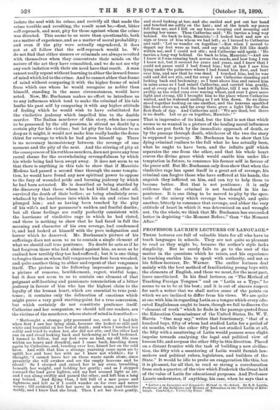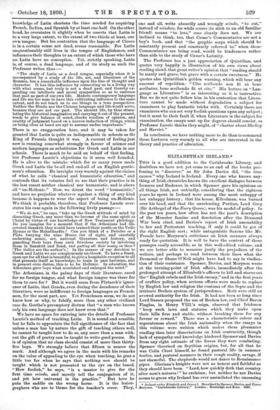PROFESSOR LAURIE'S LECTURES ON LANGUAGE.* THESE lectures are full of
valuable hints for all who have to teach languages in schools. They are not quite so pleasant to read as they might be, because the author's style lacks simplicity. But he rarely fails to go to the root of the matter in the questions which he raises, and his experience in teaching enables him to speak with authority, and not as his fellow-lecturer, Dr. Warner. The earlier lectures deal mainly with the best method of familiarising young boys with the elements of English, and these we must, for the most part, leave uncriticised. In his final lectures, on "The Method of Teaching Foreign Tongues" and on "Latin as a Type," he seems to us to be at his best; and it is out of sincere respect for such a writer that we shall notice some of the points on which we are inclined to differ from his views. We are quite at one with him in regarding Latin as a tongue which every edu- cated Englishman ought to learn, though we fail to discern the "element of truth" which he finds in the passage quoted from the Education Commissioner of the United States, Dr. W. T. Harris. "One may say," writes that functionary, "that of a. hundred boys, fifty of whom had studied Latin for a period of six months, while the other fifty had not studied Latin at all, the fifty with a smattering of Latin would possess some slight impulse towards analysing the legal and political view of human life, and surpass the other fifty in this direction. Placed on a distant frontier with the task of building a new civilisa- tion, the fifty with a smattering of Latin would furnish law- makers and political rulers, legislators, and builders of the State." It would be idle to probe an exaggeration like this, but it is pleasant, for all that, to read so strong a corroboration from such a quarter, of the view which Frederick the Great held. of the value of Latin for educational purposes. And Professor Laurie understates, if anything, his case, when he says that a.
• Lectun on Languogo and Linguistic Method in the School. By 5.8. Laurie, Professor of the Institutes and History of Education in the University of Edin- burgh. Cambridge: University Press. 1890.
knowledge of Latin shortens the time needed for acquiring French, Italian, and Spanish by at least one-half. On the other hand, he overstates it slightly when he asserts that Latin is to a very large extent, to the extent of two-thirds at least, our own tongue. But his contention that the language of Cicero is in a certain sense not dead, seems reasonable. For Latin unquestionably still lives in the tongue of Englishmen, and influences their thoughts to an extent of which those who have no Latin have no conception. Yet, strictly speaking, Latin is, of course, a dead language, and of its study as such the Professor writes thus :—
" The study of Latin as a dead tongue, especially when it is accompanied by a study of the life, art, and literature of the Romans, has a remarkable influence upon the line of thought and character. It has this influence by connecting us in a living way with what seems, but truly is not a dead past, and thereby ex- panding our intellects and moral sympathies so as to embrace that past as part of our own life. Modern contemporary language and life are too near to have this cultivating influence to the same extent, and do not teach us to see things in a true perspective. Neither the Hindu nor the Chinese language and life would serve, because they are not our past. The ancient life, by thus stimu- lating the historical imagination and carrying it out of the present, tends to give balance of mind, checks sciolism of opinion, and crudity of judgment based on a narrow induction of things, which as being close at hand are apt to assume undue importance."
There is no exaggeration here, and it may be taken for granted that Latin is quite as indispensable in schools as the King of Prussia thought it was. A current of feeling just now is running somewhat strongly in favour of science and modern languages as substitutes for Greek and Latin in our schools. There is much to be said on behalf of that feeling, but Professor Laurie's objections to it seem well founded. He is alive to the mistake which for so many years made Greek and Latin the be-all and end-all of an English gentle- man's education. He inveighs very warmly against the claims of what he calls "classical and humanistic education,'.! and contends that its votaries fail to see that their practice is in the last resort neither classical nor humanistic, and is above all " un-Hellenic." Now, we detest the word "humanistic," and have no prejudice whatever against a thing of any kind because it happens to wear the aspect of being nn-Hellenic. We think it probable, therefore, that Professor Laurie over- states his case again in the following lively passage :—
" We do not," he says, "take up the Greek attitude of mind by dissecting Greek, any more than we become of the same spirit as Christ by virtue of our knowledge of New Testament philology. Do you imagine for a moment that if the Athenians had dis- covered Sanskrit they would have trained their youth on the Vedic Hymns or the Mahabharita P Can you think of a Pericles or a Plato burying the nine Muses out of sight, and carefully eschewing music, art, national literature and history, and guarding their boys from such frivolous society by involving them in Sanskrit and Zend, and putting all their money on these ? [The italics are the author's.] In the manner of our devotion to Greek and Latin we are conspicuously un-Greek. To have a frank, open eye for all that is beautiful, to give a hospitable reception to all that presents itself as knowledge, to train in past heroisms, and in present civic duties, this is to be Hellenic. In education, the Athenians gave boys what nourished and enlarged the mind."
The Athenians, in the palmy days of their literature, cared for no foreign tongue, and what foreign tongue was there for them to care for ? But it would seem from Plutarch's ignor- ance of Latin, that Greeks, even during the decadence of their literature, were as indifferent to foreign languages as French- men, for the most part, are. Yet Frenchmen seem, we do not know how or why, to falsify, more than any other civilised
race do, Goethe's peremptory dictum that "a man who knows only his own language does not know even that."
We have no space for entering into the details of Professor Laurie's method of teaching Latin. It is sound and sensible, but he fails to appreciate the full significance of the fact that unless a man has by nature the gift of teaching others well, he cannot be taught how to do so, any more than a man with- out the gift of poetry can be taught to write good poems. He is of opinion that no class should consist of more than thirty- five boys. We strongly believe that fifteen is nearer the mark. And although we agree in the main with his remarks on the value of appealing to the eye when teaching, he goes a little too far when he says that nothing new should be taught which is not presented to the eye on the board. "How foolish," he says, "is a master to give for the first time scindo, and merely tell the conjugation of it, and yet how universal is the practice." But here he puts the saddle on the wrong horse. It is the lexico- graphers who are to blame for the teacher's error. They,
one and all, write absurdly and wrongly scindo, "to cut,' instead of soindere, for while amare (to stick to an old familiar friend) means "to love," amo clearly does not. We are inclined to think, too, that Caesar's Commentaries are not a boy's book, and that "the graphic maps which should be constantly present and constantly referred to," when those' Commentaries are being read, would be hindrances rather than aids to the study of Ctesar's Latinity.
The Professor has a just appreciation of Quintilian, and quotes very happily in illustration of his own views about reading aloud, that great writer's opinion that "reading should be manly and grave, but grave with a certain sweetness." He quotes also Quintilian's golden warning, which will bear any amount of repetition : "Cite scribendo non fit ut bene scribatur, hone scribendo fit ut cite." His lecture on "Lan- guage as Literature" is as interesting as it is instructive. But we do not quite follow him in his contention that Litera- ture cannot be made without degradation a subject for examiners to play fantastic tricks with. Certainly there are examiners who can set very foolish questions upon any subject ; but it must be their fault if, when Literature is the subject for examination, the essays sent up for degrees should consist, as Professor Laurie thinks they might, of "chatter about Shelley and Harriet."
In conclusion, we have nothing more to do than to commend these Lectures very warmly to all who are interested in the theory and practice of education.







































 Previous page
Previous page